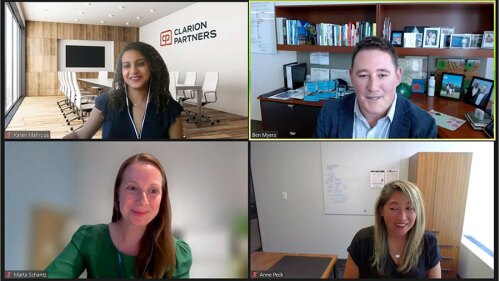Panelists at the ULI Washington Trends Conference in April said having a more diverse staff benefits the bottom line and addressed some of the ways they are trying to attract talent to the industry.
“If everyone around the table looks the same, it’s hard to get outside of that box,” said Jodie McLean, chief executive officer of EDENS, a real estate developer, operator, and owner. “Many people at EDENS do not have what we call the right résumé. They’re the right people.” McLean is also a ULI Governing Trustee.
Julie Smith, chief administrative officer at the Greenbelt, Maryland–based Bozzuto Group, a real estate development and construction company, concurred that hiring candidates from the same MBA programs is going to result in a fairly homogeneous group of people, both in terms of their racial, sexual and gender identities and in terms of their thought processes.
“If you fish in a different pool, you’ll have more diversity,” she said. She cited self-made billionaire Sara Blakely, the founder of Spanx, who was a communications major.
Usha Chaudhary, president and chief operating officer of Washington, D.C.–based developer and property manager Kettler, said that though her company has no diversity program in the traditional sense, it has grown to be diverse organically, with about an even male/female split among employees. “We want to be reflective of the community we live in and the customers we serve,” she said, a point echoed by Smith.
Panelists disagreed on how to measure diversity, or whether it should even be measured to begin with.
“To try to put a number on it is, I believe, a mistake,” Chaudhary said. “If diversity and inclusion is how you live your life, it’s not a program or initiative. It’s who you are. It’s like integrity or honesty or transparency—how would you measure that?”
But McLean said intentionally building a diverse company has yielded many benefits.
“We have been really intentional about changing our board makeup [and committing to diversity] all the way down,” she said. “We have seen operational results that outperform our peers, and so we definitely benchmark there. . . . So I think it’s not only good for our people, but it’s good for our business.”
Diversity also boosts engagement and retention, she said. Smith agreed, saying having a diverse company helps a company keep employees as they advance in their careers.
“I think one of the reasons we lose candidates is—whether it’s a minority or a woman—[they say,] ‘I don’t see anybody like me in the C suite. I have a window of opportunity, and I can either stay here and be stuck, or find a runway that’s a little bit clearer,’” Smith said.
“I think companies are really challenged with the top of their organization. Sometimes you have to move aside or put another chair at the table or do something that will give people some sense of confidence that they can achieve their career goals at the company.” Otherwise, a company can lose talented candidates to the competition. “Turnover is really expensive,” she said.
Panelists suggested that to begin building a more diverse company, hiring managers should look at more diverse candidate pools and not discount someone because his or her résumé is different from one submitted by a “traditional” candidate.
Chaudhary has begun to hire outside the industry. “I brought over some people from the Washington Post, and they’re doing great,” she said. (Chaudhary herself was chief financial officer at the media company at one time.)
But panelists agreed that employee referral programs are the best way to grow more diverse. They are “by far the best way to build an organization,” Smith said. “[Employees are] not going to risk their own reputation in your company on someone they think is going to flake out.”




